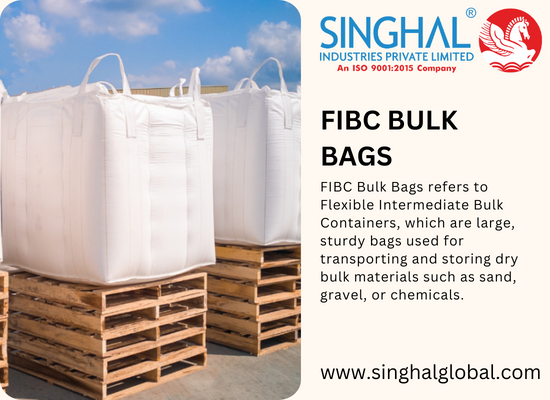Understanding FIBC Bulk Bags: A Comprehensive Guide
- Nurul Amin
- Jul 16, 2024
- 2 min read
Flexible Intermediate Bulk Containers 1 Ton Bag Exporter, commonly known as bulk bags, are versatile industrial packaging solutions designed to transport and store large volumes of materials ranging from powders to granules. These bags offer significant advantages in handling efficiency, storage convenience, and cost-effectiveness across various industries. Here’s a detailed look at everything you need to know about FIBC bulk bags:

What are FIBC Bulk Bags?
FIBC bulk bags, also referred to as big bags, are large containers made from woven polypropylene (PP) fabric. They feature flexible designs that can hold and transport bulk quantities of materials such as grains, chemicals, fertilizers, and other industrial products. These bags typically range in capacity from 500 kg to several tons, depending on the specific requirements of the application.
Types of FIBC Bulk Bags
Type A FIBC Bags: FIBC Bulk Bags Exporter Standard bulk bags made from woven polypropylene without any additional anti-static protection. Suitable for non-flammable products.
Type B FIBC Bags: Bags with low breakdown voltage to prevent the occurrence of incendiary sparks or brush discharges. Ideal for transporting dry powders.
Type C FIBC Bags: Conductive bags that feature interconnected threads to dissipate static electricity safely, preventing the risk of fire or explosion when handling flammable materials.
Type D FIBC Bags: Also known as antistatic bags, these are made from static dissipative fabrics to safely handle combustible powders without the need for grounding.
Benefits of FIBC Bulk Bags
Cost-Effective Transportation: 1 Ton Bags Manufacturer reduce shipping costs by maximizing cargo space and minimizing the need for secondary packaging.
Versatile Applications: Used across industries such as agriculture, construction, pharmaceuticals, and chemicals for transporting a wide range of materials.
Environmental Sustainability: Reusable and recyclable, contributing to sustainability goals by reducing waste and carbon footprint.
Conclusion
FIBC bulk bags represent a crucial innovation in bulk material handling, providing efficiency, safety, and sustainability benefits across industries worldwide. Whether transporting agricultural products, chemicals, or minerals, these versatile bags offer a reliable solution for companies looking to optimize their logistics and reduce operational costs. Understanding the different types and customization options ensures that businesses can select the right FIBC bulk bags tailored to their specific needs, enhancing productivity and safety in the workplace.
Frequently Asked Questions (FAQs) About FIBC Bulk Bags
Q: What are the weight capacities of FIBC bulk bags?
A: FIBC bulk bags can typically carry loads ranging from 500 kg to 2000 kg, depending on their design and intended use. Specialized designs can handle even heavier loads.
Q: How are FIBC bulk bags filled and discharged?
A: These bags are filled through a spout or an open top and discharged through a bottom spout or by lifting the bag and releasing the contents. Some bags also feature top and bottom spouts for easier filling and discharge.
Q: Are FIBC bulk bags reusable?
A: Yes, many FIBC bulk bags are designed for multiple uses, provided they are handled and stored properly. Proper care and maintenance can extend their lifespan significantly.
Q: What customization options are available for FIBC bulk bags?
A: FIBC bulk bags can be customized with various features such as liners for moisture protection, UV stabilization for outdoor use, different lifting configurations (corner lift, cross-corner lift), and specific printing or labeling requirements.



Comments